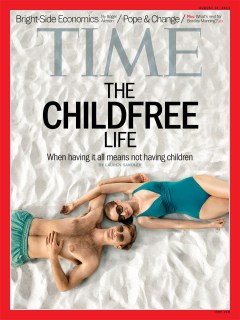 The childfree trend is experiencing its biggest mainstream-media moment ever thanks to Time’s new cover story: “The Childfree Life: When having it all means not having children.”
The childfree trend is experiencing its biggest mainstream-media moment ever thanks to Time’s new cover story: “The Childfree Life: When having it all means not having children.”
(And the magazine gets kudos for using the word childfree, preferred by those who don’t want children, as opposed to childless, which is more appropriate for people who want kids but don’t have them.)
Writer Lauren Sandler notes that an increasing percentage of Americans are bypassing parenting:
The birthrate in the U.S. is the lowest in recorded American history, which includes the fertility crash of the Great Depression. From 2007 to 2011, the most recent year for which there’s data, the fertility rate declined 9%. A 2010 Pew Research report showed that childlessness has risen across all racial and ethnic groups, adding up to about 1 in 5 American women who end their childbearing years maternity-free, compared with 1 in 10 in the 1970s. Even before the recession hit, in 2008, the proportion of women ages 40 to 44 who had never given birth had grown by 80%, from 10% to 18%, since 1976, when a new vanguard began to question the reproductive imperative. These statistics may not have the heft of childlessness in some European countries — like Italy, where nearly one-quarter of women never give birth — but the rise is both dramatic and, in the scope of our history, quite sudden.
She discusses the immense social pressure to have kids, and some of the upsides for those who resist that pressure. For starters, the financial upsides. Consider “the sheer economic cost of raising a child — for a child born in 2011, an average of $234,900 until age 18, according to the USDA, and $390,000 if your household earns over $100,000.” And the cost of taking time off from work to raise kids: “The opportunity costs for an American woman who gets off the career track could average as high as $1 million in lost salary, lost promotions and so on, economist Bryan Caplan says.”
And then there’s the sense of freedom, as articulated by one childfree woman:
“I get to do all sorts of things: buy an unnecessary beautiful object, plan trips with our aging parents, sleep in, spend a day without speaking to a single person, send care packages to nieces and nephews, enroll in language classes, go out for drinks with a friend on the spur of the moment,” says a happily partnered woman named Jenna Johnson, a Virginian who lives in New York. “I know all of this would be possible with kids, but it would certainly be more complicated. My plans — professionally, daily, long-term, even just for vacation — are free from all the contingencies that come with children.”
But the article misses one big part of the story: the green angle. Choosing not to have children is by far the biggest step an American can take to limit the size of his or her environmental footprint. I wrote about this at length a couple of years ago, while introducing the acronym GINK: green inclinations, no kids. To recap:
The global population is now 7.1 billion, and is projected to reach 9.6 billion by 2050. That’s a whole lot of people contributing to climate change and other ecological ills, and we Americans are just about the worst of the bunch. The average American generates about 25 times more CO2 each year than the average Bangladeshi — 22.2 tons versus 0.9 tons. So if an American opts against having kids, the decision has an outsized impact.
According to a 2009 study in Global Environmental Change [PDF] that took into account the long-term impact of Americans’ descendants, each child adds an estimated 9,441 metric tons of CO2 to a parent’s carbon legacy—that’s about 5.7 times his or her direct lifetime emissions. Or to look at it another way: The climate impact of having one fewer child in America is almost 20 times greater than the impact of adopting a series of eco-friendly practices for your entire lifetime, things like driving a high-mileage car and using efficient appliances and CFLs.
Still, even though Time’s article misses the eco-implications of the childfree trend, it’s way better than Newsweek’s take on the topic a few months ago. In that piece, Joel Kotkin and Harry Siegel suggest that childfree people are selfish and argue that a lower birthrate “may spell disaster for the country as a whole,” leading to “decrepitude” of our population. The article blames, among other cultural degenerates, yours truly:
[T]he childless and even the partnerless life has gained something of a cultural cachet, with some suggesting they represent not just a legitimate choice but a superior one. It’s a burgeoning movement that’s joined cultural tastemakers, academics, neo-Malthusians, greens, feminists, Democratic politicians, urban planners, and big developers. …
[U]rbanists like Peter Calthorpe … link their density agenda with environmentalism; he’s deemed dense urbanism “a climate-change antibiotic.” Decades after dire predictions of mass starvation and rising population growth lost credibility, the environmental mantra against children remains reflexive. Now greens are pushing for fewer high-income children, since they generate more carbon than offspring in poorer countries. Jonathon Porritt, an adviser to Prince Charles, has called for Britain to halve its population, arguing that having even two children is “irresponsible.” The influential Center for Biological Diversity has declared that “Homo sapiens has exceeded its sustainable population size,” while Lisa Hymas, senior editor at Grist, has signed up for what she calls a “fledgling child-free movement” to stand up against the “pro-natal bias that runs deep.” Her self-designation: “GINK, green inclinations, no kids.”
For a smarter take on childbearing trends and the health of the nation, here’s another piece from Time: “The Declining Birthrate Doesn’t Spell Disaster” by demographer Philip N. Cohen.
With the birth rate at its lowest in recorded history, some are afraid that the United States is heading toward a demographic crisis in which too few children will lead to too few workers to build — and pay for — a prosperous future. … But these fears are unwarranted. Other indicators show that we do not face a population crisis, and I believe that we have the resources to adapt to the upcoming demographic shift. …
Compared with other wealthy countries — even those with lower growth rates — we have a relatively poor record on education and health care. We would do better if we focused our attention on the wellbeing of however many of us there are instead of worrying about the fact that there might not be enough of us in the future.
Hear hear.
—–
CORRECTION: Newsweek originally misrepresented the position of the Center for Biological Diversity, then corrected its article. This post initially quoted the original, inaccurate Newsweek article, but has now been updated.



